高中英语外研版选修七Module 3
- 格式:doc
- 大小:210.00 KB
- 文档页数:18
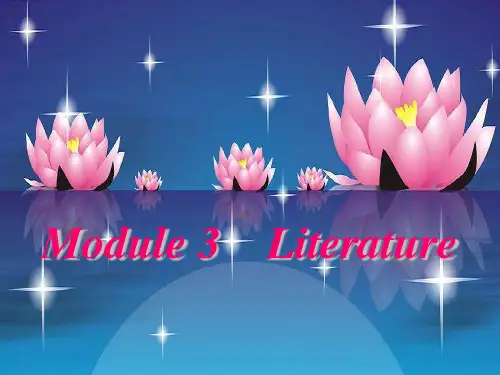



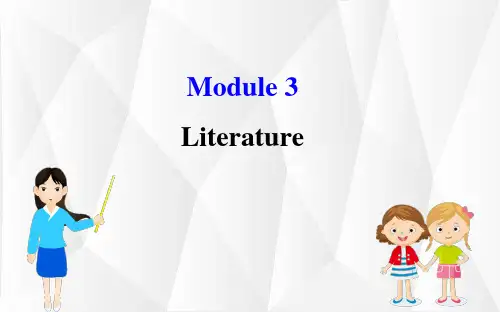
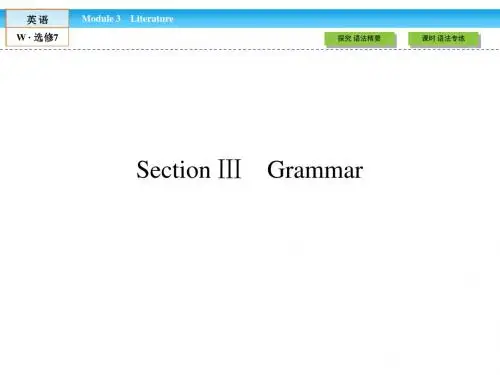
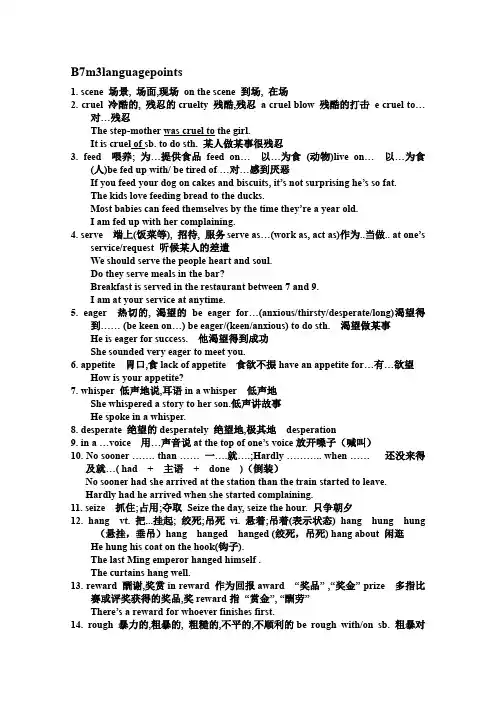
B7m3languagepoints1. scene 场景, 场面,现场on the scene 到场, 在场2. cruel 冷酷的, 残忍的cruelty 残酷,残忍a cruel blow 残酷的打击e cruel to…对…残忍The step-mother was cruel to the girl.It is cruel of sb. to do sth. 某人做某事很残忍3. feed 喂养; 为…提供食品f eed on… 以…为食(动物)l ive on… 以…为食(人)be fed up with/ be tired of…对…感到厌恶If you feed your dog on cakes and biscuits, it’s not surprising he’s so fat.The kids love feeding bread to the ducks.Most babies can feed themselves by the time they’re a year old.I am fed up with her complaining.4. serve 端上(饭菜等), 招待, 服务serve as…(work as, act as)作为..当做.. at one’sservice/request 听候某人的差遣We should serve the people heart and soul.Do they serve meals in the bar?Breakfast is served in the restaurant between 7 and 9.I am at your service at anytime.5. eager 热切的, 渴望的b e eager for…(anxious/thirsty/desperate/long)渴望得到…… (be keen on…) be eager/(keen/anxious) to do sth. 渴望做某事He is eager for success. 他渴望得到成功She sounded very eager to meet you.6. appetite 胃口,食lack of appetite 食欲不振have an appe tite for…有…欲望How is your appetite?7. whisper 低声地说,耳语in a whisper 低声地She whispered a story to her son.低声讲故事He spoke in a whisper.8. desperate 绝望的desperately 绝望地,极其地desperation9. in a …voice 用…声音说at the top of one’s voice放开嗓子(喊叫)10. No soo ner ……. than …… 一….就….;Hardly ……….. when …… 还没来得及就…( had + 主语+ done )(倒装)No sooner had she arrived at the station than the train started to leave.Hardly had he arrived when she started complaining.11. seize 抓住;占用;夺取Seize the day, seize the hour. 只争朝夕12. hang vt. 把...挂起; 绞死;吊死vi. 悬着;吊着(表示状态) hang hung hung(悬挂,垂吊)hang hanged hanged (绞死,吊死) hang about 闲逛He hung his coat on the hook(钩子).The last Ming emperor hanged himself .The curtains hang well.13. reward 酬谢,奖赏in reward 作为回报award “奖品” ,“奖金” prize 多指比赛或评奖获得的奖品,奖reward指“赏金”, “酬劳”There’s a reward for whoever finishes first.14. rough 暴力的,粗暴的, 粗糙的,不平的,不顺利的be rough with/on sb. 粗暴对待某人A rough hand/road 粗糙的手/不平坦的路have a rough time 吃苦The other boys were rough, always looking for a fight.15. escape 逃脱, 逃走, 溜走, 避免escape doing sth. 避免某事escape from 从..漏出;从..逃脱;幸免于.. a narrow escape 九死一生Gas is escaping from the pipe.escape from being fined. 免于被惩罚16. intend 打算;想要intention 意图,意向,打算.intend to do/doing sth. 打算做某事intend sb to do sth. 打算让某人做某事be intended for sb./sth. 专为…而设计的;专供…使用的.What do you intend me to do?This book is intended for young children.have no intention of doing sth. 无意做某事17.support n. 支持,维持;供养;支持者,支撑物vt. 支持,支撑,扶持,帮助;赡养,供养18. scream n. 尖叫声;尖锐刺耳的声音vi. 尖叫;发出尖锐刺耳的声音19. lock n. 锁vt. 锁,锁上20. in astonishment 惊讶地21.a huge amount of 大量的22.bring sth.to the attention of sb. 使某人注意某事。
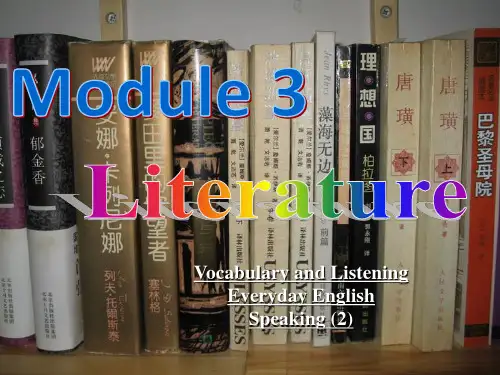



单词1.feed vt.喂(养),饲养;供给,向……提供食物vi.(牛、马等)吃东西归纳拓展feed on 以……为主食,吃……过日子feed...on/with sth.给……食物feed sth.to sb./sth.=feed sb./sth.on/with sth.用……喂养;给(人或动物)食物feed sb.up 养肥,养壮,把……喂饱feed A with B =feed B into A 提供B 给A例句:Feed the food to the baby in small pieces.用小片的食物喂婴儿。
You can’t feed a family of five on $100 a week.你无法靠每周100美元的收入来养活一家五口。
The electricity line is fed with power through an underground cable.这条电线的电源是通过地下电缆传输的。
【链接训练】①Their mother can't afford to ________ them on meat and fish every day.A .growB .raiseC .FeedD .rise【解析】 句意为:天天吃肉吃鱼,他们的母亲是供不起的。
feed sb.on sth.“给……吃……”,是固定用法。
【答案】 C②Tigers ________ meateating animals ________ meat.A .belong to ;feed onB .belonging to ;feed onC .are belonged to ;feed onD .belonging to ;feeding on【解析】 句意为:老虎属于肉食动物,以食肉为生。
句中belonging to meateating animals 作定语修饰tigers ,belong to 无被动式,feed on 意为“以……为主食”。
Module 3 LiteratureI.教学内容分析本模块以Literature为话题,介绍了著名英国古典文学作家查尔斯•狄更斯(Charles Dickens)的生平和他的作品《雾都孤儿》(Oliver Twist)、《远大前程》(Great Expectations)的片段,旨在通过这样的话题,使学生运用所学的知识谈论小说中的人物及其情节,更多地了解作家的作品及其作品的时代背景和深刻的社会意义。
通过学习能将小说中的精彩片段表演出来,让学生了解如何对人物和事件进行描写。
通过本模块学习,学生要对小说与文学有个辩证认识,学会鉴赏文学的魅力。
Introduction 通过电影Oliver Twist的一幅剧照介绍了著名作家查尔斯•狄更斯(Charles Dickens)。
并设计相关的问题对剧照中的人物和故事发展进行预测,在一定的练习中了解和熟悉所涉及到的词汇和短语,让学生进一步熟悉这些词汇,为本模块的学习奠定基础。
Reading and Vocabulary (1) 部分通过阅读《雾都孤儿》中的一段标题为“Oliver Asks for More”片段,设计了以下的任务:1. 学会对素材片段进行概括,培养学生的总结能力和对文章中心的把握能力;2. 学习相关的词汇和短语,为进一步理解课文扫清障碍,培养学生学习生词的能力,解决了方法问题,同时设计一定的练习,巩固所学习的词汇;3. 在词汇学习的基础上,通过完成素材中的句子填写练习,完成从词到句的功能转变,让学生不仅能学习词汇,而且能更好地巩固一定固定意义的句子结构。
Grammar (1) 部分通过观察课文中的例句,要求学生能够识别倒装句的基本形式,并能运用倒装表达强调意义。
Speaking (1) 部分是阅读文章后所展开的一项活动,要求学生能够模仿其内容和角色进行适当的角色扮演练习,并对人物进行评价。
Vocabulary and Listening部分为《雾都孤儿》的精彩片段,旨在听的基础上去理解这部小说,并完成四项任务:1. 提供一定的句子和词汇,扫清了听力中可能产生的障碍;2. 提供问题,预测听力内容和问题答案,引导听力任务的顺利进行;3. 听取一段精彩的片段,判断所预测的问题答案是否正确,然后回答问题;4. 要求听第二遍,完成信息获取。
任务环环相扣,遵循听力训练的规律,真正为学生提供了模拟真实的听力材料。
Grammar 2and Function部分列举一些句子,让学生通过先观察然后回答问题的方式了解通常情况下的强调句型,并进行适当的训练。
同时将这样的练习运用到实际的语境中,即对小说中人物进行评论,进一步巩固强调句的运用。
通过该项目,更好地将强调句的学习全面地展开和总结,让学生通过相关练习活动掌握这种表达法。
Speaking (2)部分分组进行训练,要求学生能用所学习的句型发表对听力部分所学习素材的评价和看法,并对故事情节的发展作一些猜测。
Everyday English 部分围绕日常生活中常见的交际用语,主要通过选择题的形式使学生熟练掌握这几个表达。
Reading and vocabulary (2)部分实际上是《远大前程》(Great Expectations)的故事梗概,通过这样的素材设计了三个活动:1. 文章的主旨大意和词汇;2. 通过回答问题,对文章内容的进一步理解;3. 通过阅读配的图画,判断人物之间的关系。
Writing部分就提供的人物,要求学生围绕人物进行简单描写,尽可能地运用自己的语言,然后分组讨论,对文章最后两段进行改写,使故事结尾不同于原著。
Reading practice部分以“Dickens’ London”为标题,提供的文段是对作家狄更斯写作和生活背景的简单介绍,有利于学生更好地了解作品的背景及其深刻的社会意义。
通过提供的任务学习,让学生更好地掌握一定的阅读理解的方法和技巧:如文章体裁、文章主旨大意、文章的细节等等,而且让学生用自己的语言完成一定量的句子填空,熟悉和运用适当的句型。
并在此基础上学会描写自己的家乡。
Cultural Corner部分是一篇介绍著名作家查尔斯•狄更斯(Charles Dickens)的生平和他的作品的文章,通过学习有助于学生更好地理解这两部小说,帮助学生拓展词汇,增加作品理解的空间。
Task部分是对本模块的一个复习与应用,要求学生小组活动,表演查尔斯•狄更斯(Charles Dickens) 作品中的一幕,加深对作品的理解。
Module File部分有助于学生对本模块学习内容进行归纳,对自己的学习进行总结和检验。
II.教学重点和难点1. 教学重点(1)掌握一些与小说故事情节描写有关的词汇;(2)学习倒装句;(3)学习强调句。
2. 教学难点(1)正确理解和听懂相关小说的片段,并能进行表演和发表看法和评论;(2)正确使用倒装句和强调句;(3)学会从小说的背景、情节、人物了解文学的内涵,并能以此为结构描述自己家乡的变化。
III.教学计划本单元分六个课时:第一、二课时:Introduction, Cultural Corner, Reading Practice第三课时:Reading and V ocabulary (1, 2)第四课时:Grammar (1, 2)第五课时:V ocabulary and listening, Everyday English, Listening and Speaking (Workbook)第六课时:Speaking (1,2) Writing, Module FileIV.教学步骤Periods 1~2 Introduction, Cultural Corner, Reading PracticeTeaching Goals:1. To arouse Ss’ interest in learning about novels.2. To get Ss to learn some words to describe stories and about the living background of the writer. .3. To get Ss to know something about Charles Dickens.Teaching Procedures:Step 1. Introduction1. To arouse Ss’ interest in learning this period, ask them to look at the film picture on page 29 and read the passage. Then answer the questions in Activity 2 in order to predict the story—Oliver Twist.Suggested Answers:(1) Oliver looks like beggar in rags.(2) He’s in a small factory or a big church and he is asking for something to eat or…Workhouse in the story maybe a place where you should work but you are not paid, but get little to eat.(3) Maybe he is asking the man to give him something to eat because he is so hungry.(4) The other boys are looking at Oliver and hope Oliver will be given a punishment by the man.(5) In my opinion, the man is cruel and unkind.(6) After that Oliver is going to be locked in a dark room or kicked out of the church or workhouse.2. Matching the definitions with the words in Activity 1.Step 2. Cultural CornerPurpose: To get Ss to find out more information about the famous novelist.1. Give Ss the works that Dickens wrote to let them know what a great writer he is. Ask Ss to say something about Dickens and his works if they know.Fictions ( publishing years) ChineseThe Pickwick Papers (1836-1837) 《匹克威克外传》Oliver Twist (1837) 《雾都孤儿》Nicholas Nickleby (1838-1839) 《尼古拉斯•尼古贝》The Old Curiosity Shop (1840- 1841) 《老古玩店》Barnaby Rudge (1841) 《巴纳比•拉吉》2. Ask Ss to read the passage quickly and then give the main idea of each paragragh.For your reference:Para 1: Charles Dickens’ birth and his schooling (education) and his childhood as well.Para 2: Charles Dickens’work or experiences, which has influenced his fictions and stories.Para 3: Charles Dickens’ writing experiences.Para 4: Charles Dickens’ influence and contributions.3. Ask Ss to read the Cultural Corner carefully and discuss the questions on page 41. Suggested Answers:(1) His father was in prison, and he had to make a living by working in a factory as a child; He worked for a newspaper and a political journalist in his novels.(2) The story has a happy ending. Oliver Twist at last found out who his parents were and found a loving home.(3) Dickens often wrote about the social problems related to the poor people, who lived a hard life, so that the lives of the poor were improved.4. Ask Ss to understand the difficult sentences.(1) His father was put in prison because he could not pay his bills.(2) He was very unhappy, but later in life, he was able to write very well about poverty because he has actually experienced it himself.(3) Dickens always had a huge amount of energy.(4) However, it brought child poverty to the attention of the public, and for this reason alone it is a very important novel.Step 3. Reading practice1. Ask Ss to finish Activity 1 to predict what the passage is about, according to the title “Dickens’ London”.2. Ask Ss to read the passage quickly and decide the structure of the passage.For your reference:Part 1 (paras 1~2): A general introduction to Dickens’ London, Dickens’ cast of characters lived in London, and London was a filthy city for rich and poor people alike in the middle of the 19th century.Part 2 (paras 3~5): Detailed descripti on of Dickens’ London, about the east end and the west end.Part 3 (paras 6~7): The ending of the passage, London has changed, but you can still see many of sights which Dickens saw and wrote about in his novels.Then ask Ss to finish Activity 2 to choose the main idea of the passage.3. As Ss have a general impression of the passage, get them to finish Activity 3 to decide the text type of the passage. Then ask them to read the passage carefully and then finish the exercises in Activities 4 and 5.4. Ask Ss to discuss the following key sentences:(1) Every chapter of his novels describes the sights, sounds, and smells of the city, and provides a social commentary of London life.(2) The East End was London’s poorest district, where children wore rags for c lothes and the women searched in dustbins for food.(3) Many people suffered from the effects of poor nutrition and even starvation because ofa lack of food, yet their welfare was of no concern to the taxpayers of London.(4) The West End is the theatre district where Dickens felt at home because, surprisingly, he thought he would accomplish more with his drama than with his novels.Step 4. Homework1. Ask Ss to read more about Charles Dickens and his works Oliver Twist and The Great Expectations.2. Ask Ss to do Reading (another fiction written by Charles Chickens) in the Workbook3. Ask Ss to preview Reading and V ocabulary in the module.Period 3 Reading and Vocabulary (1, 2)Teaching Goals:1. To let Ss master how to read a passage.2. To let Ss master some words and phrases.3. To get Ss to talk something about the novels.4. To help Ss learn how to talk about the characters in novels.Teaching procedures:Step 1. RevisionCheck whether Ss have finished their homework.Step 2. Leading-inGive Ss several film posters of Oliver Twist and The Great Expectations, and then ask them to express their opinions about the two works.Step 3. Reading and Vocabulary (1)1. Ask Ss to finish Activity 3 on page 32 to learn the new words. If they don’t know the meanings, they can look up the dictionary.2. Ask Ss to fill in the following blanks with the correct form of the words just learnt.John has just got out of prison. Now he is ___(1)____ to hunt for a job to ___(2)_____ his big family, but he has not been ___(3)______ for three months yet. Yesterday he was walking on the street when he was __nudged ______ by somebody, and the man ____(4)____ him by his arm. To his great ___(5)_____, it was one of his ____(6)______. They were so excited to meet each other at first, but a ___(7)_____ look appeared on John’s face at once when John heard that the man has been ___(8)____ by the government and is going to work abroad. Suggested Answers:(1) eager (2) support (3) employed (4) seized(5) astonishment (6) companions (7) desperate (8) rewarded3. Ask Ss to read the story quickly and choose the best summary in Activity 1 on page 30.4. Get Ss to find out where the words of Activity 2 are in the passage. Then ask them to choose the best meaning.5. Ask Ss to read the passage carefully and complete the sentences in Activity 4 on page 32.6.After the reading,Ask Ss to say what they know about the following things or characters.(1) The poor and hungry boys (2) the warden (3) the managers (4) The storyFor your reference:(1) The poor boys each were allowed a bowl of soup no more. The bowls never needed washing. They sit staring at the pot with eager eyes. They became wild with hunger. The soup was served and disappeared down the boy’s throats…(2) The warden was a fat, healthy man. He hit the boy on the head with the soup spoon. Then he seized Oliver’s arms and held him…(3) When Mr Bumble told the managers…, the faces of everyone in the room showed great complete astonishment because Oliver asked for more.(4) The story is part of the novel, so it tells us in a narrative way with dialogues. From the story we can learn that the society and background of the story and novels.Step 4. Reading and vocabulary (2)1. Ask Ss to read the passage quickly and describe the film picture in Activity 1 on page 37. Then ask them to say the relationship between the man and the boy in the picture.2. Ask Ss to read the passage carefully and work in pairs to discuss the questions in Activity 2.3. Ask Ss make sure of the meanings of t the words given in Activity 3. They can look up the dictionary. Then ask them to complete the sentences with the correct form of the words.4.Ask Ss to read the passage carefully and say something about the characters Pip, Estella, Miss Havisham and Abel Magwitch.Step nguage PointsAsk Ss to discuss the important language points in groups. Then give them some explanation.1. The room in which the boys were fed was a large stone hall, with a large pot at one end.孩子们住的房间是一个很大的石头砌成的厅,在一角有一个很大的锅。